Republicans and Democrats tend to view a third-party presidential run as either a pest to be ignored or a threat to their ultimate vote share — depending on the candidate’s political persuasion. An inbuilt advantage exists for the legacy parties that would take an upheaval of historic proportions to upset. But it has happened, and with dramatic results. The possibility of an insurgent rush to the 2024 ballot appears to be causing night terrors in the DC Swamp.
West Virginia Sen. Joe Manchin gave his strongest hint yet that he may be ready to take the third-party plunge during a recent interview. “I’ve been part of No Labels since December of 2010,” he said, referencing the self-described “centrist” organization. “It’s the only game in town that wants to bring people together and get Democrats and Republicans working together.”
Asked point blank whether he would join the No Labels ticket, Manchin responded, “People are starving, starving to work together.” He said voters are sick of “this constant, daily routine of everyone’s against everybody and everybody’s fighting and arguing,” adding, “Let’s be for the country and get something done.”
But Manchin isn’t the only politician that could abandon the two-party ship.
Lessons From the Time Warp
It is not unheard of for a third-party candidate to make a big splash. Just consider Theodore Roosevelt, who in 1912 – after serving two terms as a Republican president (1901-1909) – made a play for another term under the Progressive Party banner. He took six states and a huge 27% of the popular vote, beating out his former protégé and then-president, William Howard Taft. Woodrow Wilson romped home with that election, capturing just 41% of the vote. If Roosevelt had stuck with the GOP, history might have been very different.

Ross Perot (Photo by Arnold Sachs/Consolidated News Pictures/Getty Images)
Another big third-party contender was Ross Perot. In 1992, Perot filled the covers of magazines and the airwaves with a surprisingly populist approach to government. “Waiting for Perot,” quipped Time magazine, Gallup polls gave him almost 40% of the vote; it certainly seemed that if an outsider were going to take the helm for the first time since the establishment of the two-party norm in 1860, then Perot was the man to do it.
Despite claiming almost 19% of the popular vote, Perot ultimately came in third behind then-incumbent President George H.W. Bush, and the winner, Bill Clinton. After a less successful 1996 run as head of the Reform Party, Perot made nice with the Republicans. Many ascribe Bush’s loss to Perot’s involvement. Finishing almost six million votes behind Clinton, if Bush had secured just a quarter of Perot’s 20 million, the Clinton Dynasty might never have begun.
Third-Party Voices in the Wilderness?
Perennial presidential candidate and political activist Ralph Nader summed up what he thought was the true role of the third-party hopeful:
“In this rigged, two-party system, third parties almost never win a national election. It’s obvious what our function is in this constricted oligarchy of two corporate-indentured parties — to push hitherto taboo issues onto the public stage, to build for a future, to get a young generation in, keep the progressive agenda alive, push the two parties a little bit on this issue and that.”
And while Nader’s heyday is in the past, Tucker Carlson – who despite his recent firing is still very much a force to be reckoned with – echoes a similar position when it comes to the two-party system. Shortly after his ousting, he released a video message in which he bemoaned the cozy apparatus that prevents any semblance of serious debate on issues of substance. “Both political parties and their donors have reached consensus on what benefits them, and they actively collude to shut down any conversation about [important topics],” he warned.
A Unique Moment in History?
 The fact of the matter is that if a prospective candidate is worried that his or her third-party campaign could risk splitting the vote for one party and allowing another to claim the throne, then this was never truly an independent run. Historian Richard Hofstadter remarked, “Third parties are like bees: once they have stung, they die.”
The fact of the matter is that if a prospective candidate is worried that his or her third-party campaign could risk splitting the vote for one party and allowing another to claim the throne, then this was never truly an independent run. Historian Richard Hofstadter remarked, “Third parties are like bees: once they have stung, they die.”
This fatalistic approach may have been the mission of the outsiders historically, but something new is afoot: Both Joe Biden and Donald Trump are distinctly unpopular. A tiny minority of the voting public wants Biden to run for office in 2024 (just 26%), and while Trump polls a little higher, his popularity is further underwater than the current commander-in-chief (-16%).
With such unique circumstances and a population distinctly unimpressed with the Fourth Estate’s blatant favoritism, there has never been a better time for a third-party candidate to make his or her name. The fear of the electorate emanating from the nation’s capital is almost palpable, and perhaps that’s the way it should be.
All opinions expressed are those of the author and do not necessarily represent those of Liberty Nation.
Do you have an opinion about this article? We’d love to hear it! If you send your comments to [email protected], we might even publish your edited remarks in our new feature, LN Readers Speak Out. Remember to include the title of the article along with your name, city, and state.
Please respect our republishing guidelines. Republication permission does not equal site endorsement. Click here

